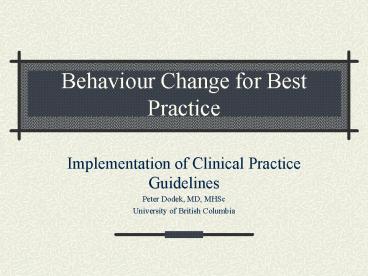Behaviour Change for Best Practice - PowerPoint PPT Presentation
1 / 24
Title:
Behaviour Change for Best Practice
Description:
University of British Columbia. Nutrition and Practice Guidelines. Medline search 1966-2003: ... Practice Guideline is associated with more Appropriate' Tests ... – PowerPoint PPT presentation
Number of Views:30
Avg rating:3.0/5.0
Title: Behaviour Change for Best Practice
1
Behaviour Change for Best Practice
- Implementation of Clinical Practice Guidelines
- Peter Dodek, MD, MHSc
- University of British Columbia
2
Nutrition and Practice Guidelines
- Medline search1966-2003
- 232 articles about practice guidelines
- 253 articles that are practice guidelines
3
Outline
- Theories of behaviour change
- Effective and ineffective implementation
strategies - A real-life example
4
Social and Behavioural Theories
- Diffusion of Innovations
- Early and late adopters
- Readiness to change
- Pre-contemplation, contemplation, preparation,
action, maintenance - Health Education
- Educational needs, active strategies
- Social Influence
- Opinion leaders, academic detailing, group
workshops - Social Ecology
- Environment clinical reminders, teachable
moment
5
Characteristics of Innovations
- Perceived relative advantage
- Compatibility--with existing values, past
experiences, and needs of potential adopters - Complexityto understand and use
- Trialability
- Observabilityof results
Rogers EM. Diffusion of Innovations (4th ed) Free
Press, 1995.
6
(No Transcript)
7
The Innovation-Decision Process
- Knowledge
- Persuasion
- Decision
- Implementation
- Confirmation
Rogers EM. Diffusion of Innovations (4th ed.)
Free Press, 1995.
8
Push, pull, capacity model
- Push rigorous guideline development
- Pull create demand for guidelines
- Endorsement by professional organizations,
linkage between guideline outcomes and quality
measures - Capacity systems to facilitate implementation
- Audit/feedback, benchmarking, benefit coverage
Curry SJ. Chest 2000 118 40S-46S.
9
A Conceptual Framework for Implementation of
Guidelines
- Assess practitioners readiness for change
- Eg. Survey of practice, needs, willingness
- Assess barriers to guidelines use--survey
- Determine level of intervention
- Individual/group or population
- Design dissemination/implementation strategies
- Multiple focus on knowledge, attitudes, and
skills - Evaluate effectiveness of implementation
strategies
Moulding NT et al. Qual Health Care. 1999 8
177-183.
10
Effective Implementation Strategies
- Educational outreach academic detailing
- Opinion leaders
- Patient-mediated interventions
- Reminders (especially computer-generated)
- Audit and feedback
- Multi-faceted
Grimshaw JM et al. Med Care. 2001 39 (supp 2)
II2-II45.
11
Less Effective Implementation Strategies
- Passive dissemination alone
- Traditional didactic approaches
- Peer comparison/physician profiling
- Case management
- Retrospective feedback
Weingarten S. Chest 2000 118 4S-7S.
12
Practice Guideline for Blood Gas Measurement in
the ICU
- Tension for Change
- Participation
- Constancy of Purpose
- Process Improvement
- Implementation Strategies
- Evaluation
- Dissemination of Results
13
Tension for Change
- Critical Care services 10-15 of health care
costs - Arterial blood gas measurement most common test
in the ICU - Clinical uncertainty about indications
14
Participation
- Who are the key stakeholders?
- Physicians, nurses, respiratory therapists,
laboratory physicians, clinical epidemiologist - Internal and external reviewers
15
Constancy of Purpose--Aim
- To assist physicians, nurses, and respiratory
therapists who care for patients in the Intensive
Care Unit setting in the decision to measure
arterial blood gas tensions - This guideline is an attempt to improve
appropriateness and consistency of ordering this
test
16
Process Improvement
- Describe current process
- List change concepts
- Re-design process
- External review
- New algorithm
17
(No Transcript)
18
Implementation Strategies
- Multi-pronged
- Pocket cards at bedside
- Seminars
- Decision support
- Audit and feedback
19
Evaluation
- Numbers of tests done
- Appropriateness of tests (compliance with
guideline) - Clinical outcomes ventilator days, length of
stay, ICU mortality - Costs
20
Practice Guideline is associated with Fewer Tests
21
Practice Guideline is associated with more
Appropriate Tests
22
Practice Guideline is associated with Savings
23
Sharing Results
- Poster presentations
- Hospital newsletter
- Publication Critical Care Medicine. 1997
251308-1313
24
Summary
- Start with a rigorously developed guideline
- Consider needs of the intended users
- Choose multiple effective strategies
- Evaluate































